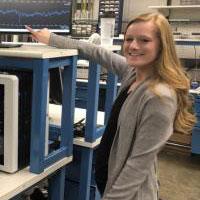
I'm starting my third year of my PhD in electrical engineering. I currently work in the ALSET Lab under the supervision of Dr. Luigi Vanfretti, where my research is in modeling and system identification for cyber-physical electrical systems, specifically electrified aircraft and traditional power plants. I finished my BS and MS in electrical engineering through the co-terminal program at RPI in 2019. I was awarded both the NSF GRFP and Chateaubriand Fellowship in 2020.
What have been some of the benefits of your fellowship experience; what have you enjoyed the most?
My fellowship has allowed for a lot of flexibility in my research so I can work on things that I am interested in instead of working on what projects my advisor has funding for. This has allowed me to collaborate with a variety of groups and people that I would not have done otherwise; my NSF fellowship has provided the flexibility to work in system identification research and the Chateaubriand fellowships has given me an advisor to explore those ideas with! I was also able to work with some researchers in the MOVE group at RPI to study the effects of multi-domain modeling on electric drivetrains for eVTOL (electric vertical take-off and landing), which I wouldn't have had the flexibility and time to pursue without NSF GRFP.
What has been the most challenging aspect of the fellowship experience?
It's been challenging to do my research remotely to the full extent that I had hoped for my Chateaubriand fellowship. I was supposed to be in France for a few months to complete the research, and it's been difficult to navigate language barriers and time zone differences while remote. It's tough to get real-time feedback when we only share about a third of the same workday, and I wish I had the opportunity to just be able to pop into someone's office to get quick questions answered instead of trying to do it over email or having to go out of the way to set up meetings. This is a challenge that's very much a result of life right now, so hopefully it won't be an issue in the near future :)
What has surprised you about the fellowship experience?
Just how much flexibility my fellowship gave me to pursue my own research interests. I didn't realize at first how many small tangents I could explore when I first applied for my fellowships, but I realized quickly that I could gain skills and research experience in these small tangents. I wasn't awarded either of my fellowships until the first year of my PhD, so when I applied I was nervous that I wouldn't have specific ideas that I wanted to explore. Over the year between when I submitted my application and received feedback from the programs, I matured a lot as a researcher. It was perfect timing that the opportunity to explore what I wanted came right when I was starting to have my own ideas. I say this just in case anyone has the self-doubt that the opportunity would be "wasted" on them that the feeling will change and you shouldn't pass up applying just because of that. :)
I am also immensely thankful for the research experience that Chateaubriand gave me, since I was able to work with an advisor whose area of expertise complemented Dr. Vanfretti's very well. Dr. Vanfretti has a lot of experience in power systems and modeling, while my French advisor has a background in math and system identification applied to power systems. This gave me an interesting insight for my dissertation and an invaluable set of skills that cover control, power systems, and system identification that I probably would not have gotten without that collaboration effort.
What is your vision for your future: what do you expect to be doing after your fellowship?
My NSF fellowship will cover me through the end of my PhD, so I hope to go into industry power systems research after I graduate.
What advice to you give current students considering applying to programs?
Start early and use all of your resources at RPI for help! There's tons of info sessions that cover the basics and timeline for a lot of fellowships, so it's a great starting place to get a lot of background info and get your questions answered. I made sure to prepare my essays early to get feedback from Betty, who is really helpful at making sure all of your materials address the qualities the fellowship program is looking for. See if there's other students that have been recently awarded the fellowship you applied for, so you can get in contact with either them or their advisor for advice and possibly reference essays. I personally did this for my NSF GRFP application with another professor in ECSE whose student was awarded the fellowship years ago, and they were really helpful in guiding me to make sure my research proposal was the best it could be from a technical point of view. A lot of the NSF GRFP example essays on the web are from people studying hard sciences, so their approaches toward research questions and experiment design are wildly different than the way engineers would approach them.
The National Science Foundation Graduate Research Fellowship Program awards three-year graduate fellowships to fellows who are expected to contribute significantly to research, teaching, and industrial applications in science, mathematics, and engineering. The award includes salary (stipend) and tuition.
The Chateaubriand Fellowship is a grant offered by the Embassy of France in the United States. It supports outstanding PhD students from U.S. institutions who wish to conduct part of their doctoral research in France for a period ranging from 4 to 8/9 months. Chateaubriand fellows are selected through a merit-based competition, with expert evaluation in France and in the United States.
